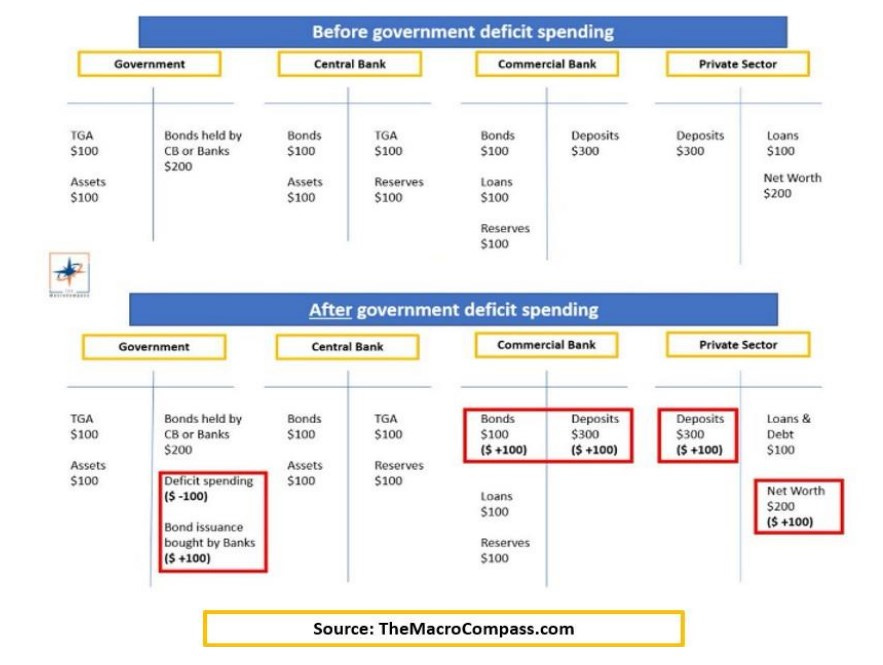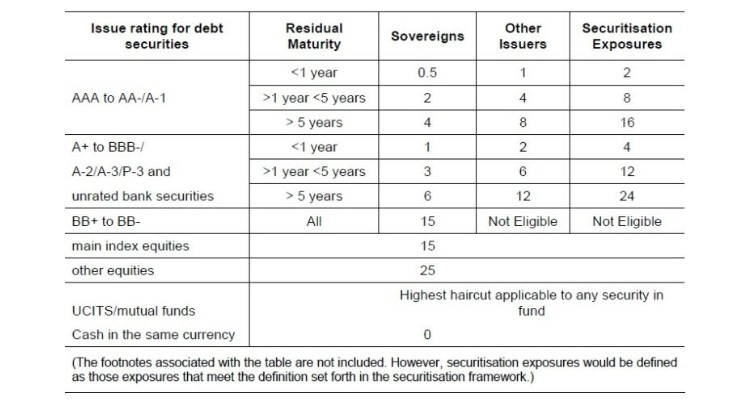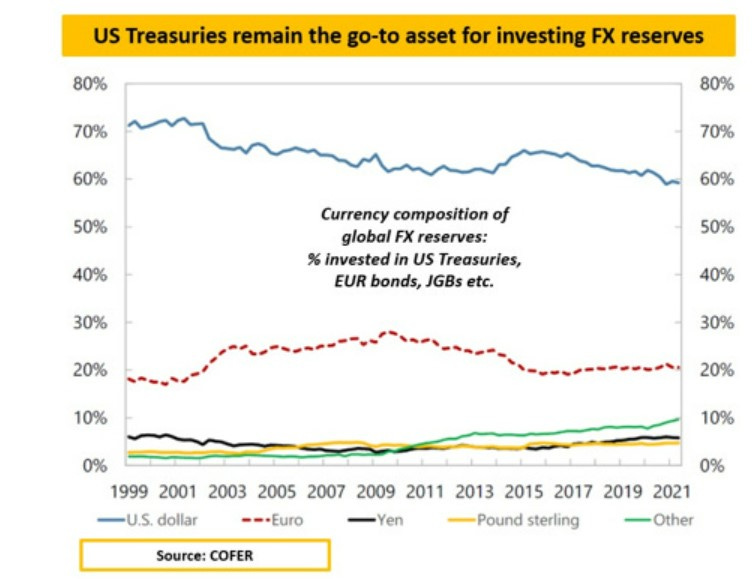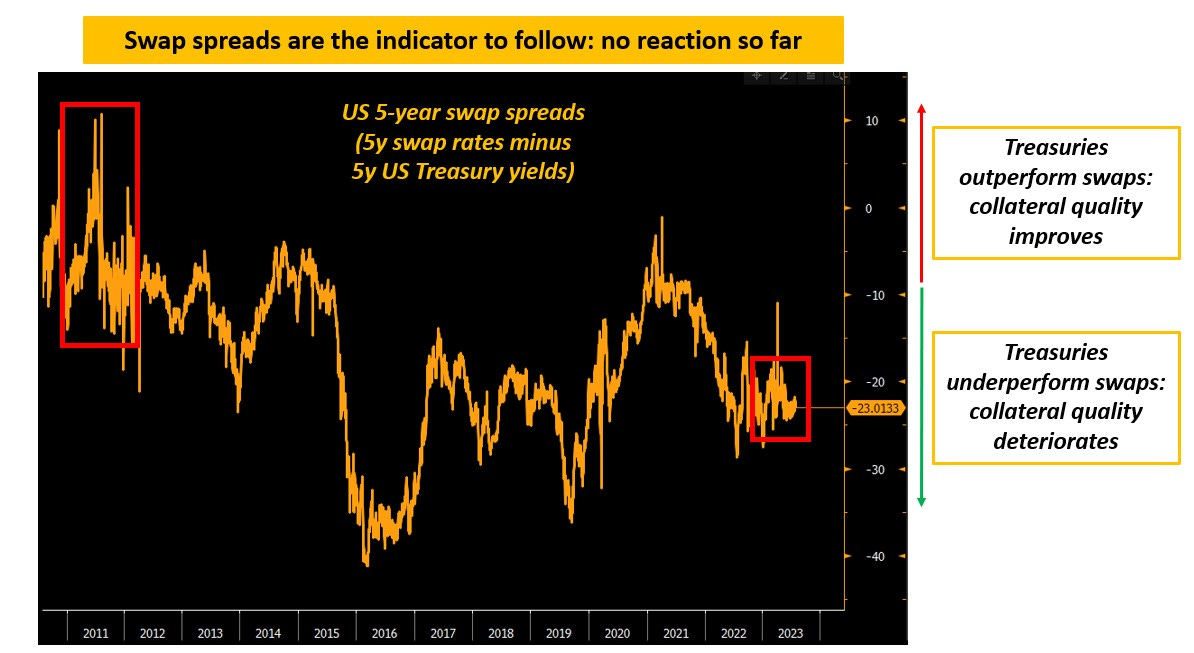Are we back in 2011 or what?
After the US debt ceiling drama earlier this year, we just witnessed a rating agency downgrading the US exactly like in 2011 – back then S&P, this time Fitch.
Today you are likely to read plenty of scary and fear-mongering headlines.
In this piece instead, we’ll take a step back and rationally assess what the US downgrade means for investors and markets out there.
A few words on the reasons behind the downgrade: Fitch pointed out the prolonged discussions on debt ceiling show ‘’deterioration in the standards of governance’’ and the rating agency also sees an economic downturn ahead which is likely to weaken government finances further.
The chart below shows the US spending on interest payments nearing an annualized $1 trillion: a scary chart…if you think the US government has a constrained budget like a household.
But that’s not how it works.

The government doesn’t ‘’need to find money’’ before delivering deficit spending: the government is the very issuer of the money the private sector uses, so its balance sheet doesn’t work like ours.
Deficit spending creates a hole in the government’s balance sheets and increases our net wealth (it’s nice when they cut your taxes or throw cheques at you, right?) – this increases bank deposits in the system.
More bank deposits (liability for a bank) imply more bank reserves (assets for a bank) in the system too, and when the government issues bonds to ‘’fund’’ its deficit spending, primary dealers can swap these reserves (or use the repo market) for newly auctioned Treasuries.
There are more steps and versions of how this could work, but this stylized example should help you understand the main concept: deficit spending creates money for the private sector, and the government doesn’t ‘’need to find money’’ to spend money – the government creates money in the first place.

Repeating this concept is useful to demystify ‘’scary’’ charts like the one you saw before: yes, government interest payments are rising, but it’s not like the US needs to ‘’choose’’ between spending on interest and spending money in the real economy – its balance sheet doesn’t work like ours.
The real limitation to uncontrolled deficit spending is inflation and scarcity of resources (2021-2022 prime example) and not some budget constraints typical of a household.
How Does Fitch Downgrade Affect Investors and Market Participants?
The key point is that US Treasuries now have their second-best rating at AA+ instead of AAA, given that only Moody’s preserved its top rating for the US.
US Treasuries are the most widely used form of collateral in the world due to their high rating, liquidity, deep repo market, and solid democratic foundations/rule of law: does the downgrade affect that?
Let’s have a quick look at the rating requirements that different institutional players must adhere to when investing in safe government bonds to explore whether a downgrade to AA+ makes a difference.
Commercial banks are huge buyers of Treasuries: they use them as regulatory liquid assets (HQLA), as collateral, and also sometimes as an asset to hedge interest rate risk on their liabilities.
The Basel regulatory framework introduced 10 years ago has 0% capital requirements for government bonds rated between AAA and AA- for its standardized approach: the downgrade to AA+ wouldn’t make any difference.
Most banks actually choose an internal-rating-based (IRB) approach based on internal models, and in that case, most jurisdictions apply an exception for any investment-grade rated domestic government bond, which automatically assigns them a 0% risk weight.
Bottom line: for banks, this downgrade makes no difference at all.

Pension funds and insurance companies are also large buyers of Treasuries: they use them as a long-duration asset to match their long liabilities (life insurance payouts, pension payouts etc) and as collateral.
For a pension fund, considerations about risk/return profile are important: they not only need to hedge interest rate risk but also try to deliver long-term returns to make the pension system sustainable over time.
AAA-rated or AA+-rated US Treasuries would still fall in the hedging camp or in the defensive asset allocation camp, and a one-notch downgrade wouldn’t make the difference.
When it comes to collateral usage, pension funds, and insurance companies are very active in the repo market: they lend their unsecured cash parked at a bank against collateral to upgrade the safety of their ‘’cash’’ deposits – does a downgrade affect the collateral status of US Treasuries?
These are the recommended haircuts that the Basel committee suggests to apply to collateral lent/received in these transactions:

As you can see, bonds rated between AAA and AA- all fall within the same bucket.
Certain pension funds have stricter collateral demands and only accept AAA collateral, though, but still, the marginal impact of the Fitch downgrade is likely to be extremely minor.
Big buyers of US Treasuries also include FX reserve managers: Chinese or Brazil corporates selling stuff for USD will deposit these US Dollars in the domestic banking system, and so the Bank of Brazil and PBOC would be in charge of investing these USDs in safe, liquid assets – you guessed it: US Treasuries.

For FX reserve managers, rating considerations are important, but again most countries put AAA-AA rated governments in the same risk bucket.
More importantly, as 70%+ of global transactions are still in USD, there will always be structural demand to recycle these USDs in safe US Treasuries.
What’s the alternative anyway? JGBs with no free float? Europe with a smaller AAA-AA bond market? BRICS with no liquid bond market and democracy/rule of law issues?
As you can see, for most institutional players out there, this downgrade has no material impact that would make them a force-seller of US Treasuries.
But let’s say you want to look at one market indicator that truly signals stress around this – what would it be?
If markets were worried about the collateral quality of US Treasuries, this would be reflected in swap spreads.
Swap spreads are nothing else than the differential between swap rates and Treasury yields: OIS swap yields measure the market-implied return you can make by safely depositing money at the Fed, and hence if Treasury yields rapidly deviate from that it could be because of collateral quality considerations.
There are also other drivers behind swap spreads, but it’s one of the cleanest things to follow here.
In 2011, 5-year swap spreads were very volatile around the downgrade but ended up stabilizing soon after.
Today, we have had no reaction at all so far.

In the short-term, markets can overinterpret and overreact, so it’s important to keep track of sentiment and price action, but in the long run this article covered why this downgrade shouldn’t affect markets much.
